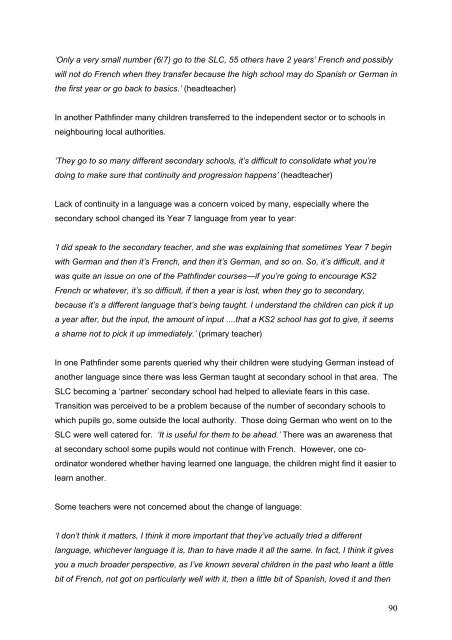Evaluation of the Key Stage 2 Language Learning Pathfinders
Evaluation of the Key Stage 2 Language Learning Pathfinders
Evaluation of the Key Stage 2 Language Learning Pathfinders
You also want an ePaper? Increase the reach of your titles
YUMPU automatically turns print PDFs into web optimized ePapers that Google loves.
‘Only a very small number (6/7) go to <strong>the</strong> SLC, 55 o<strong>the</strong>rs have 2 years’ French and possiblywill not do French when <strong>the</strong>y transfer because <strong>the</strong> high school may do Spanish or German in<strong>the</strong> first year or go back to basics.’ (headteacher)In ano<strong>the</strong>r Pathfinder many children transferred to <strong>the</strong> independent sector or to schools inneighbouring local authorities.‘They go to so many different secondary schools, it’s difficult to consolidate what you’redoing to make sure that continuity and progression happens’ (headteacher)Lack <strong>of</strong> continuity in a language was a concern voiced by many, especially where <strong>the</strong>secondary school changed its Year 7 language from year to year:‘I did speak to <strong>the</strong> secondary teacher, and she was explaining that sometimes Year 7 beginwith German and <strong>the</strong>n it’s French, and <strong>the</strong>n it’s German, and so on. So, it’s difficult, and itwas quite an issue on one <strong>of</strong> <strong>the</strong> Pathfinder courses—if you’re going to encourage KS2French or whatever, it’s so difficult, if <strong>the</strong>n a year is lost, when <strong>the</strong>y go to secondary,because it’s a different language that’s being taught. I understand <strong>the</strong> children can pick it upa year after, but <strong>the</strong> input, <strong>the</strong> amount <strong>of</strong> input ....that a KS2 school has got to give, it seemsa shame not to pick it up immediately.’ (primary teacher)In one Pathfinder some parents queried why <strong>the</strong>ir children were studying German instead <strong>of</strong>ano<strong>the</strong>r language since <strong>the</strong>re was less German taught at secondary school in that area. TheSLC becoming a ‘partner’ secondary school had helped to alleviate fears in this case.Transition was perceived to be a problem because <strong>of</strong> <strong>the</strong> number <strong>of</strong> secondary schools towhich pupils go, some outside <strong>the</strong> local authority. Those doing German who went on to <strong>the</strong>SLC were well catered for. ‘It is useful for <strong>the</strong>m to be ahead.’ There was an awareness thatat secondary school some pupils would not continue with French. However, one coordinatorwondered whe<strong>the</strong>r having learned one language, <strong>the</strong> children might find it easier tolearn ano<strong>the</strong>r.Some teachers were not concerned about <strong>the</strong> change <strong>of</strong> language:‘I don’t think it matters, I think it more important that <strong>the</strong>y’ve actually tried a differentlanguage, whichever language it is, than to have made it all <strong>the</strong> same. In fact, I think it givesyou a much broader perspective, as I’ve known several children in <strong>the</strong> past who leant a littlebit <strong>of</strong> French, not got on particularly well with it, <strong>the</strong>n a little bit <strong>of</strong> Spanish, loved it and <strong>the</strong>n90

















